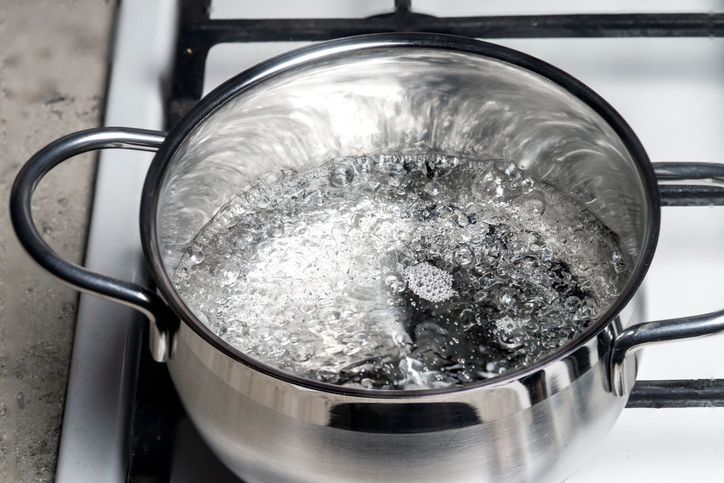EMERGENCY GUIDELINES
Stay informed and prepared with Marion County Health Department's emergency guidelines. Be ready for boil orders and power outages by knowing what steps to take to ensure your safety and well-being.
Boil Order Guidelines
Stay safe and healthy during a boil order with these simple tips from Marion County Health Department. Remember to boil water for at least one minute before using it for cooking or drinking. Practice proper food prep safety by washing fruits and vegetables with boiled water. And don't forget to wash your hands thoroughly with soap and boiled water to prevent the spread of harmful bacteria.

During a boil water order, water may serve as a source of contamination for food, food equipment, utensils and hands.
Therefore the following is guidance for food establishments to follow when a boil water order is issued:
- Voluntarily cease operations until the boil water order is lifted
- Obtain an alternate supply of potable water and/or ice and provide satisfactory methods for handwashing, food preparation, and equipment cleaning and sanitation.
Note: water for drinking or cooking must be vigorously boiled for three (3) minutes prior to use or the establishment must use bottled water from a commercially approved source or other source approved by the Missouri Department of Natural Resources (DNR) or Missouri Department of Health and Senior Services (DHSS). Ice must also be from an approved source. Discard ice that may have been made from or exposed to contaminated water.
HAND WASHING DURING A BOIL ORDER
Wash your hands for at least 20 seconds under running water with soap, followed by drying with paper towels or approved air-drying device and subsequent application of a hand sanitizer. Hand sanitizers are not a substitute for proper handwashing.
ICE MACHINES
Ice machines that are directly connected to the water system must not be used. Shut the machine down and leave the unit off until the water supply is declared acceptable for use. Discard ice that may have been made from or exposed to contaminated water. Once the boil order is lifted run 3 batches of ice through the unit, discard that ice, clean and sanitize the ice bin, and start using the fourth batch of ice.
FOOD PREPARATION
Produce
- Use prewashed, pre-packaged produce
- Use produce washed prior to the boil water order
- Use frozen/canned produce
- Wash fresh product with potable water from an alternate approved source
Preparation and cooking requiring water, including and reconstitution of liquid concentrates and dried foods
- Use only food that was prepared prior to the boil water order
- Discontinue sale of prepared foods requiring water
- Obtain prepared foods from alternate source (i.e. local deli or caterer)
- Use potable water from alternate approved source
Carbonated and other beverages
- Substitute with bottled or canned beverages and turn off water lines to beverage dispensers. Such dispensers shall be completely flushed and sanitized before being returned to service after the boil water order has been lifted.
- Use potable water from alternate approved source.
Coffee Machines
- Coffee machines that are directly connected to the water system can be used if the water reaches a boiling temperature (212℉) for one (1) minute. If you are not sure how hot the water gets, then bottled water from an alternate, approved source or previously boiled water must be used.
Utensils and food contact equipment
- A properly operated manual dishwashing arrangement should be satisfactory for sanitizing utensils so long as the normal washing, rinsing, and sanitizing steps are followed and provided that the concentration of sanitizer (chlorine, iodine, quaternary ammonia) is at the proper level
- A properly operating and maintained mechanical temperature or chemical dishwashing machine should also be satisfactory for sanitizing utensils
- Use only single-service tableware and kitchenware
- Use potable water from an alternative approved source
- Store food dispensing utensils in the food products
After the boil water order is lifted
- Flush the building water lines and clean faucet screens, water line strainers on mechanical dishwashing machines etc.
- Purge all water lines connected to fixtures and appliances, such as ice machines, beverage makers, produce and seafood misting devices, hot water heaters etc.
- Clean and sanitize all fixtures, sinks and equipment connected to waterlines.
- Follow the manufacturer’s recommended procedures for:
- disinfecting water softeners, prior to putting them back into service;
- replacing filters or media in small filters on ice machines, water treatment systems, beverage vending machines; and replacing carbon filters or carbon media in filters.
Power Outage
During a prolonged power outage, the Marion County Health Department emphasizes the urgency of properly storing food items that require refrigeration. Without power, refrigerators and freezers can only keep food at a safe temperature for a limited time, posing potential health risks to the community. Stay informed and take necessary precautions to protect your health.

As the owner or operator of a food establishment, you are responsible for maintaining your products in a wholesome condition. You are also responsible for ensuring that temperature-abused, or otherwise adulterated food products are not passed on (sold, traded or given) to consumers as their consumption can lead to outbreaks of serious foodborne illnesses.
If electricity has not yet been restored to your establishment and you have been unable to make alternate arrangements for the storage of your refrigerated, potentially hazardous food products, the following guidelines shall be adhered to:
- All refrigerated, non-shelf-stable, potentially hazardous food items must be maintained at a temperature of 41° F or below and be protected from physical damage including water, chemicals, unauthorized personnel, etc. Potentially hazardous foods are primarily those containing meat, fish, poultry and dairy products.
- If the temperature of any non-shelf-stable, potentially hazardous food item exceeds 45° F for a period exceeding two (2) hours, the product must be discarded.
- If the temperature of any non-shelf-stable, potentially hazardous food item exceeds 45° F, and you cannot ascertain how long the product has been above 45° F, the product must be discarded.
- Frozen foods that become thawed, but remain below 45° F pose quality concerns, NOT public health concerns. Decisions regarding the use/and or refreezing of these products rest with their owner. If, however, the temperature of the thawed products exceeds 45° F for a period of two (2) hours, they too must be discarded.
- To prevent or discourage pilferage of discarded food products, the food should be denatured by pouring liquid bleach, ammonia, soap or similar products over the discarded food items in the dumpsters or trash cans. Notify your waste hauler to arrange for special pick-ups if necessary.
By adhering to the above stipulations, you can prevent serious illnesses from occurring, as well as protect yourself and your business from potential legal liabilities. You should keep an inventory of all discarded products for insurance purposes. Consult with your insurance carrier regarding specific requirements.
Remember that this is your responsibility. Health department staff members or our authorized representatives will be conducting checks of establishments to ensure compliance with food code regulations.
